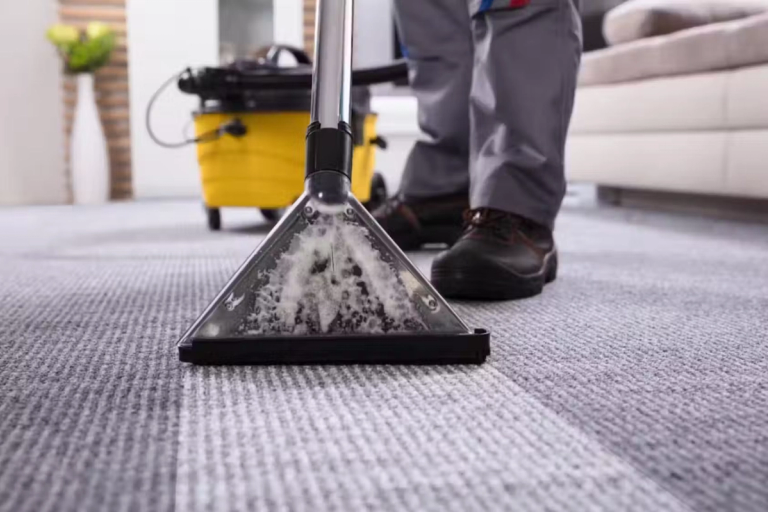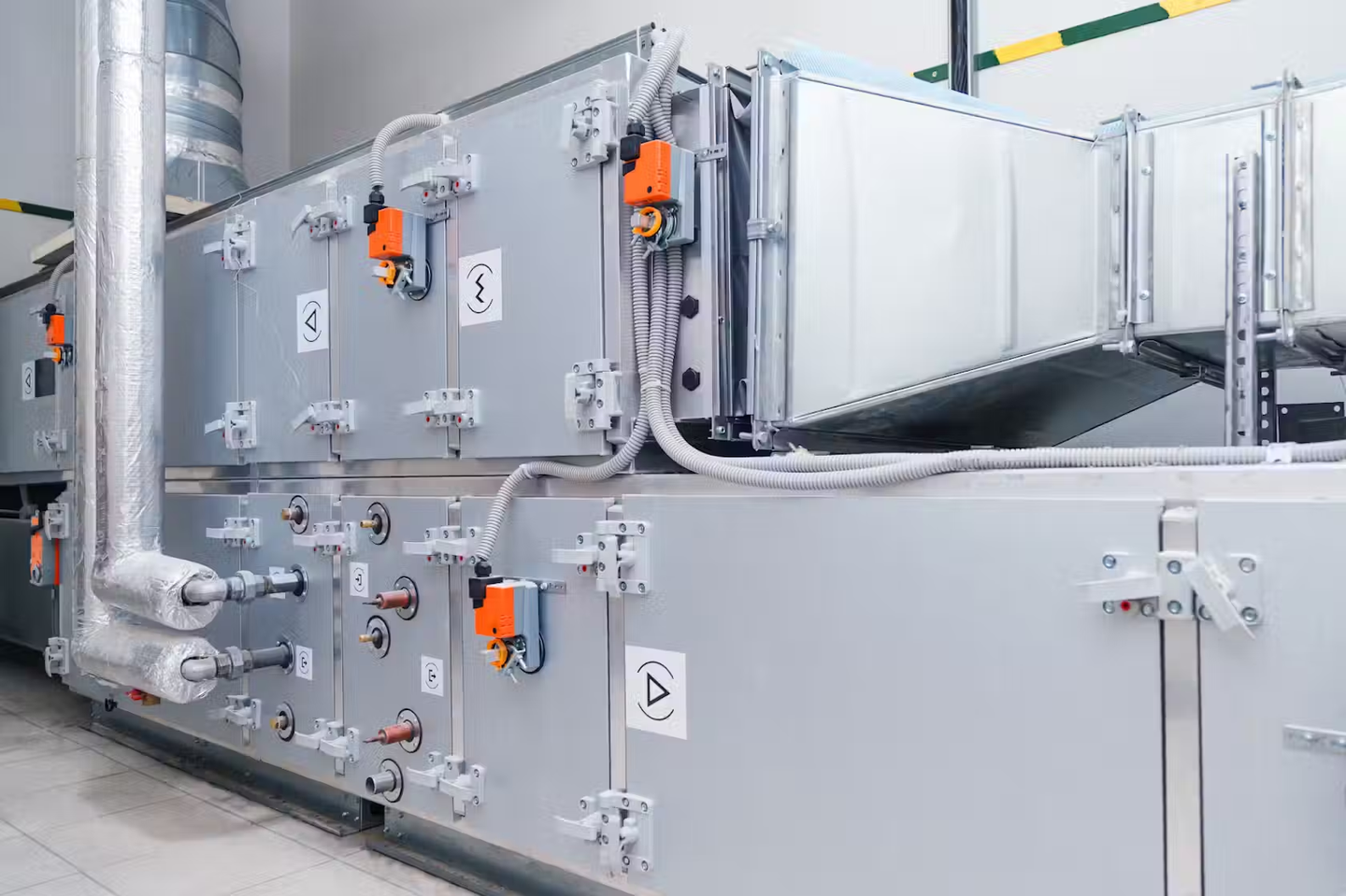If you're in the need for a fast & efficient heater for your commercial setting, we have a wide range of direct and indirect fuel heaters that can provide large volumes of heat, as well as radiant heaters that create intense, localised heat.
At HSS ProService, we can help you find the perfect commercial heating solution.
Air handling units
What is an air handling unit?
Air handling units are essential in the distribution of air within a building. They condition, filter and disperses air through ductwork as well as provide heating or cooling to the space. These units are best used in conjunction with a boiler and can be used both internally & externally depending on the type of air handling unit hired. Air handling units are suitable for medium to large commercial and industrial buildings. Depending on how much heat you require, you may need to hire more than one unit.
The benefits of an air handling unit?
- Commercial air handlers can move 2,000 to 10,000 cubic feet per minute which makes them perfect for covering large areas with ease.
- Air-handling units provide both heating and cooling functions with just one unit, so you won't need to hire or buy more.
- Air handling units provide you, your staff and visitors with a much safer & more comfortable working environment. An air handling unit cleans and rids the air of harmful particles that enters your building, and it can also adjust the humidity.
Direct fuel heaters
What are direct fuel heaters?
A direct fuel heater is a heating device that uses natural gas or propane to heat the air. Heat is generated by burning an open flame but in a safe and effective manner. An air-fuel mixture is channelled through heaters so that the right amount of each is injected. These units are best for those who want a consistent flow of hot air throughout their commercial space. Be sure to always place a direct fuel heater in well-ventilated workspaces and warehouses.
The benefits of direct fuel heaters
These industrial heaters provide high amounts of heat, perfect for food storage sites and outdoor applications.
1. The biggest advantage to direct fuel heaters is the efficiency of them. Almost 100% of the fuel burnt is converted into direct heat output, minimising operating costs and fuel consumption.
2. These units are incredibly low maintenance and rarely break down. This means that you won't have to worry about repairs and the heater will last longer than many other types of heaters.
3. Despite delivering high volumes of heat, these units are portable and easy to transport. This means that you can move the heater from different sites or sections of your workspace as and where you see fit.
Please note - As a result of burning fuel, toxic gases are released into the workspace where the heater is used, so because of that, direct fuel heaters will not be able to be installed in poorly ventilated workspaces where people or animals are present so be sure to get in touch with our online live chat team or contact your local branch to check if a direct fuel heater is suitable for your premises.
Indirect fuel heaters
What are indirect fuel heaters?
Unlike direct-fired heaters, indirect units use a heat exchanger to warm up the air. The burner is contained in a chamber where it's fed by a supply of propane or natural gas. The flame heats the metal of the heat exchanger, which then passes hot air through it and into the building or outdoor area. Through a chimney or stack, indirect fired heaters direct toxic fumes outside of space to keep carbon monoxide, carbon dioxide, and nitrogen dioxide from entering the space. This means that it is safe to be installed indoors and in compact spaces, providing there is an exhaust duct outlet. Indirect fuel heaters are suitable to use in hospitals, schools, arenas and retail shops. They can be used both indoor or outdoor & provide a strong heat source for a large area.
The benefits of indirect fuel heaters
- Indirect heaters can be used for a variety of jobs, from heating a room of people or for drying assistance in the event of a flood.
- They are a great way to heat large spaces by using natural gas or propane without having to worry about harmful toxins.
- Indirect fuel heaters are designed with built-in thermostats that automatically turn off when the desired temperature is reached, so you won't have to worry about overheating or turning the unit off.
Radiant Heaters
What are radiant heaters?
Radiant heaters are a popular type of heater for commercial settings. They work by converting electricity into heat. This type of heating is different from traditional convection heaters. Radiant heaters - also known as infrared heaters - have no visible flame. Instead, they emit invisible infrared radiation that heats objects in its path. These heaters provides a comfortable amount of heat & are ideal for social settings and outdoor areas like patios and seating areas. Radiant heaters are some of the most energy-efficient heating units that can be used in restaurants, office spaces and similar settings by plugging them into indoor electric sources.
The benefits of radiant heaters
1. They are more cost-effective to run compared to other heaters that use fuel.
2. This electric heating unit can be used as both indoor and outdoor heaters. Many restaurants and outdoor bars use these heaters as an efficient method of heating as it provides fast and instant infrared heat.
3. Boosting your immune system & improving blood circulation are just a few of the surprising health benefits from having a radiant heater. Infrared heaters also help to relieve symptoms associated with allergies, such as congestion, watery eyes, and sneezing.
Alternative Eco-Friendly Solutions
Air-Source Heat Pumps
One of the most popular eco-friendly heating solutions are heat pumps. There are different variations of heat pump systems available, all of which are extremely energy efficient.
All heat pumps share one great benefit; for every unit of electricity they consume, they produce triple the amount of heat compared to a standard electrical heater. Installing heat pumps is a great way to reduce your carbon footprint and cost efficiency at the same time.
How do they work?
(Who's ready for the science?) All heat pumps work by extracting heat from one place and transferring it to another. They transfer heat by pushing a refrigerant through the process of evaporation and condensation.
Air-source heat pumps absorb warmth from the outside air. That air is then used to heat the indoors and can also be used to heat hot water tanks. The air-source heat pump is placed outside the property in order to pull in the air from outside and the generated heat can then be distributed through the building’s heating system.
Heat pumps are not entirely impact-free when it comes to energy as they do require energy to run however an air-source heat pump is still up to five times more efficient than a traditional gas central heating system.
In addition to being energy efficient, heat pumps are also cost-effective as they can reduce your heating bill. (and who wouldn't want that?
Whether you want a small electric radiator or a large 42kW heater, we've got you and your industrial or commercial space covered. The HSS online live chat team or our staff in your local store are on hand and happy to help you find the best heater for you.






















































